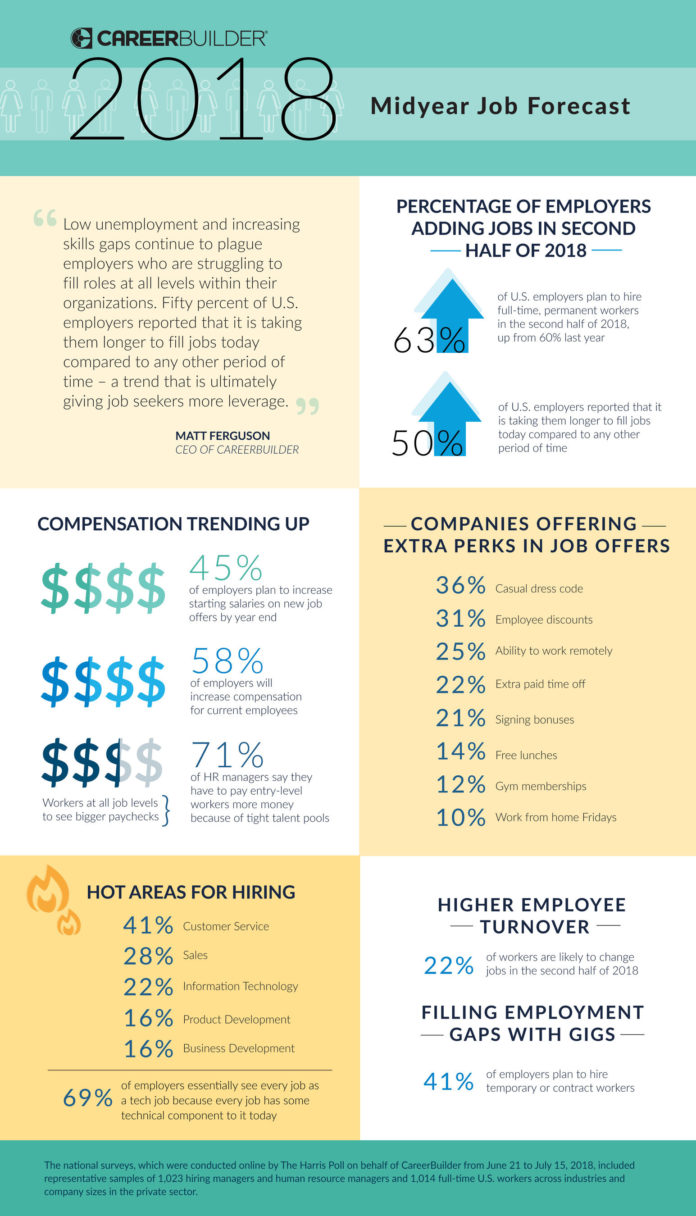3 in 5 employers are planning to hire full-time, permanent workers in the back half of 2018
As employers grapple with a highly competitive hiring environment that is causing prolonged job vacancies across the U.S., workers are reaping the benefits. According to CareerBuilder’s Midyear Job Forecast, 63 percent of U.S. employers plan to hire full-time, permanent workers in the second half of 2018, up from 60 percent last year. A substantial percentage of employers hiring in the second half of 2018 are expecting to offer higher salaries and various perks — such as signing bonuses, extra paid time off, free lunches and the ability to work remotely — to attract and keep the talent they need.
“Low unemployment and increasing skills gaps continue to plague employers who are struggling to fill roles at all levels within their organizations,” said Matt Ferguson, CEO of CareerBuilder. “Fifty percent of U.S. employers reported that it is taking them longer to fill jobs today compared to any other period of time — a trend that is ultimately giving job seekers more leverage.”
The national surveys, which were conducted online by The Harris Poll on behalf of CareerBuilder from June 21 to July 15, 2018, included representative samples of 1,023 hiring managers and human resource managers and 1,014 full-time U.S. workers across industries and company sizes in the private sector.
Compensation to Increase Across Job Levels
Employers expect to provide a greater financial incentive to new workers and existing staff. Forty-five percent plan to increase starting salaries on new job offers in the back half of 2018; 23 percent of all employers plan to increase starting salaries by 5 percent or more. Fifty-eight percent of employers will increase compensation for current employees before year end, with 24 percent of all employers planning an increase of 5 percent or more on average.
The study shows that compensation increases aren’t limited to high-skill positions. Looking at a subset of human resource managers, 71 percent believe they have to pay entry-level workers more money because of tight talent pools.
Hot Areas for Hiring
From a functional standpoint, the top roles employers hiring in the second half of 2018 say they will be hiring include:
- Customer service – 41 percent
- Sales – 28 percent
- Information technology – 22 percent
- Product development – 16 percent
- Business development – 16 percent
Additional Trends to Watch
- Companies offering extra perks – In an effort to draw in more applicants and, ultimately hires, employers hiring in the second half of 2018 said they would be highlighting different perks in their job offers:
- Casual dress code – 36 percent
- Employee discounts – 31 percent
- Ability to work remotely – 25 percent
- Extra paid time off – 22 percent
- Signing bonus – 21 percent
- Free lunches – 14 percent
- Gym memberships – 12 percent
- Work from home Fridays – 10 percent
- Daycare – 8 percent
- More jobs getting technical – Sixty-nine percent of employers said every job is essentially a tech job because every job has some technical component to it today. That sentiment is reflected in how employers recruit and interview for different roles.
- Higher employee turnover – With job growth continuing at a healthy clip, more than 1 in 5 workers (22 percent) reported that they are likely to change jobs in the second half of 2018.
- Companies hiring for gigs – Forty-one percent of employers plan to hire temporary or contract workers in Q3. While trending down from 50 percent last year, temporary or contract hiring continues to be a key way employer fill employment gaps and recruit permanent staff.
Survey Methodology
This survey was conducted online within the U.S. by The Harris Poll on behalf of CareerBuilder among 1,023 hiring and human resource managers ages 18 and over (employed full-time, not self-employed, non-government including 309 HR managers) and 1,014 employees ages 18 and over (employed full-time, not self-employed, non-government) between June 21 and July 16, 2018. Data for employers were weighted where necessary by company size and job level and data for employees were weighted where necessary by gender, age, race/ethnicity, region, income, education, and industry to bring them into line with their actual proportions in the population.




